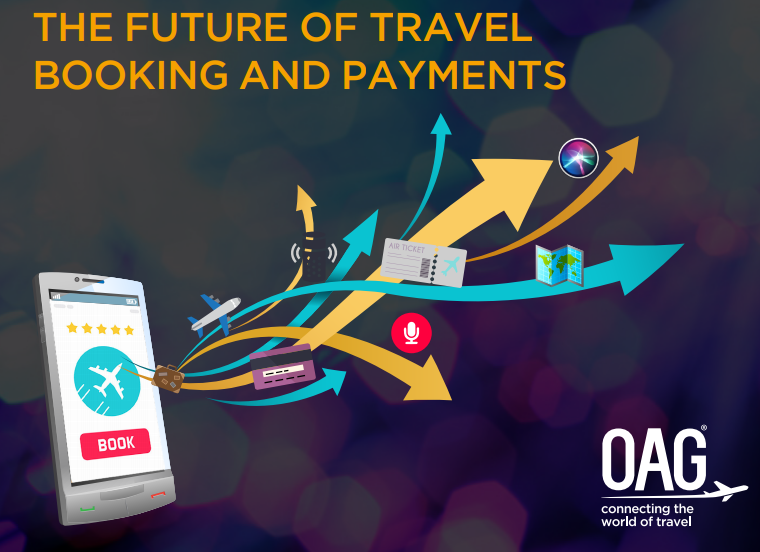Summary:
- A new study from data intelligence specialist OAG suggests new payment options of the future could change the way we buy flights and other services;
- A survey of 2000+ US travellers reveals more than one in four would be comfortable with automated chat agents on websites (28%) and mobile assistants like Siri and Okay Google (25%);
- Meanwhile, the report shows that 44% of travellers would be comfortable booking travel through Amazon and 14% through Facebook;
- The online travel market is expected to drive upwards of USD693 billion in sales in 2018 and new entrants and competitive disruptions are "a formality" according to OAG.
We are already used to turning to social media for our customer service needs with airlines, whether that be a complaint or a simple information request. Likewise, airlines are using social media and informal content marketing strategies to reach a wider audience than with traditional marketing initiatives. But, would we be comfortable to actually use such channels to book flights in the future? Well, findings from OAG's latest Travel Tech Innovation: Market Report would seem to suggest just that.
'The Future of Travel Bookings & Payments' report shows that 44% of travellers would be comfortable booking travel through Amazon, if given the option; 14% would also be comfortable booking travel through Facebook. Meanwhile, 25% of consumers said they would be comfortable booking travel through mobile assistants like Siri or Okay Google, and 14% of millennials said they would be willing to use Bitcoin to pay for travel and related services.
The new report is a follow-up to OAG's detailed look at the anticipated adoption of several disruptive technologies, including predictive analytics, artificial intelligence, blockchain, supersonic planes and autonomous vehicles. It continues the conversation by exploring the future of travel booking, modern payment methods and the growing role of social media and consumer platforms in the industry based on a survey of more than 2,100 US travellers.
As a group, business travellers were more inclined to use just about every non-traditional booking compared to the general population and Many OTAs are already capitalising on this opportunity with Expedia, Kayak and Skyscanner among the travel providers that are already allowing customers to book flights and hotels over Facebook Messenger.
The online travel market is expected to drive upwards of USD693 billion in sales in 2018, according to Statista, an online statistics, market research and business intelligence portal. OAG says new entrants and competitive disruptions are "a formality" it is hard to see which channels will dominate the new payments landscape. The new reports certainly delivers some food for thought.
When questioned which non-traditional technologies and methods the survey respondents would be happy booking through more than one in four were comfortable with automated chat agents on websites (28%) and mobile assistants like Siri and Okay Google (25%); one in five would be happy to use text messages (20%) and to a lesser extent travellers were happy to use voice automated systems like the Google Home (18%) and social media messaging apps, like Facebook Messenger and WhatsApp (9%).
Many organisations talk about becoming the 'Amazon of air travel'. Well. The OAG report suggests that Amazon itself could be at the centre of future air travel bookings with 44% of travellers saying they would consider booking travel with the e-commerce giant, if possible, the highest ranking of the specific social and consumer platforms highlighted. But it isn't just the case it was the number one, it is how far ahead of others that Amazon ranked that will surprise many with the next most viable alternative, based on the travellers surveyed, was Facebook, where just 14% said they would be willing to book.
"Convenience, speed and customer experience rule the travel ecosystem - and the booking and payment process is no exception," says Mike Benjamin, chief technology officer at OAG. "Travellers are already relying on social media platforms like Twitter and Facebook for customer service. While we don't expect a major shift in the travel booking market overnight, the threat of new start-ups and major tech players radically simplifying or transforming the experience should not be discounted."
Payment methods are another variable influencing the future of travel booking. OAG asked travellers which modern payment options they would be willing to use to book and pay for travel and related services: 49% mentioned PayPal as a top contender, followed by Apple Pay (42%) and Google Wallet (22%). Millennials were more than twice as likely to use bitcoin (14% versus 6% of the general population), and substantially more inclined to use Apple Pay (56% of millennials) and Google Wallet (29% of millennials) to pay for travel purchases.
"All eyes are on the travel booking landscape. Today's consumers have more channels, technologies and platforms to book travel through than ever before," added Mr Benjamin. "While the industry won't change immediately, legacy airlines and booking engines need to continue to aggressively invest in innovation and the customer experience, both to win more market share and to fend off potential new entrants."
READ MORE: See the full findings from the OAG study: The Future of Travel Booking and Payments
